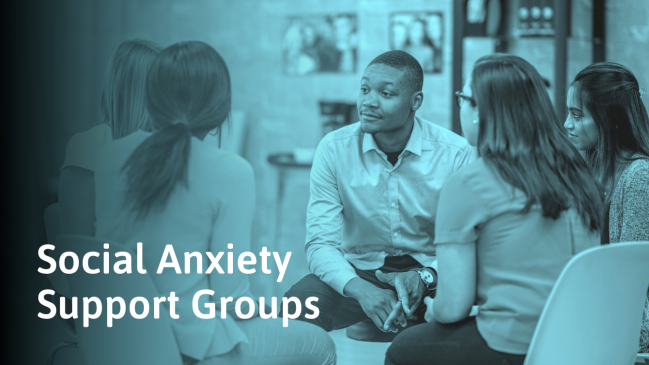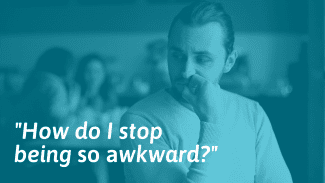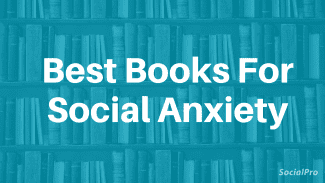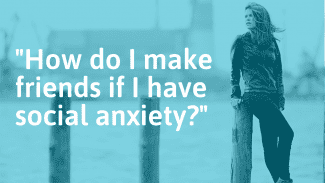Having social anxiety can make you feel completely alone, like this must be a “you” problem. But statistics show that 6.8% of adults and 9.1% of teens in America have social anxiety disorder.[1]
There are literally millions of people out there going through a similar struggle. People who—just like you—would like to reduce the loneliness and social isolation they feel because of it.
This is where support groups come in. They give you the opportunity to share your challenges with people who have the same or similar problems. It helps to talk about your problems with people who understand what you’re going through.
Perhaps you can see how this makes sense, but you’re still hesitant to join a support group. You dread the thought of having to talk to others at all, never mind in a group setting. So, it’s hard for you to imagine how a support group could help you overcome this very fear.
Even if you were convinced that a support group could benefit you, you wouldn’t know where to begin looking for one.
In this article, you will find information on how to find Social Anxiety support groups in-person and online. You’ll also learn the difference between support groups and group therapy. This will help you choose the type of group support that suits you best.
You’ll learn what social anxiety disorder is and is not, and find answers to some common questions about social anxiety disorder.
Sections
- 5 things to consider when choosing a social anxiety support group
- How to find a social anxiety support group in-person
- How to find a social anxiety support group online
- What is the difference between a support group and group therapy?
- What social anxiety disorder is and is not
- Common questions
5 things to consider when choosing a social anxiety support group
Before searching for a social anxiety support group to join, it is important to know how groups differ. This will help you make an informed decision about what kind of group will be best for you.
Here are 5 things to be aware of when searching for a social anxiety support group:
1. Group support can be online or in-person
There is more to gain from joining in-person meetings. They enable you to face your social phobia in a real-life setting.[2]
If your social anxiety is severe, or if you want to remain anonymous, then an online support group may be a better fit. Also, if you’re not able to commute to meetings, or if there are no groups in your local area, you can opt for online support.
The online option that is most like the in-person one would be a support group that meets over video conference, like Zoom. Other online options include discussion forums and chat rooms. Here, you can chat anonymously with, and get support from, others struggling with social anxiety.
2. Support groups can be open or closed
Open support groups allow new people to join and leave a group at any time. In closed groups, members are required to join the group at a specific time and to commit to meeting regularly for a couple of weeks together.[3]
In general, support groups are usually open, and group therapy groups are usually closed.
In a closed group, you’d be meeting with the same people each week, so you’d be able to work with other members in a more structured way to overcome your fears.[3] This is a good option if you’re ready to make a commitment to attending a support group regularly. It also offers more comfort and familiarity. The downside? It can take time to find this kind of group, and you may have to be put on a waitlist.
Open groups, because of their flexibility, can be a better fit for people who don’t want to commit to regular meetings.
3. Support groups may have a size limit
Before you join a support group, it would be useful to check the group’s size limit.
In a large group, it is very difficult for each person to be able to share equally. It also becomes difficult to take in and process what others share. Aim for groups with 10 or fewer members.
4. There are support groups for social anxiety only
Some support groups are more inclusive. This means that they could be for people struggling with any type of anxiety versus social anxiety on its own.
While these groups can be helpful, there may be a greater benefit in attending a group focused exclusively on social anxiety.
The reason for this is that social anxiety disorder is treated and managed quite differently from other disorders. Also, it helps to be placed with people who can relate to the same issues that you’re experiencing.[4]
5. Support groups can be free or paid
Usually, when a support group requires you to pay, it’s because that group is being led by a trained instructor or mental health professional. Professionally led, paid groups would usually be more structured. They would also follow psychological best practices for the treatment of social anxiety disorder.[5]
Some groups are led by volunteers: these could be people who have taken a short training course in running support groups. They could be people who have experienced or overcome social anxiety themselves.
There’s no saying that you won’t get as much out of one group versus another. You need to take everything into consideration and decide what type of group would be best for you.
How to find an in-person social anxiety support group
Joining an in-person support group—if you have the courage—would probably bring the most benefit. That’s because you will get to face your fears in the real world, as opposed to from behind a screen. This would make for an easier transfer of the new social skills and knowledge that you will pick up from the group.
It can be a challenge to find an in-person group. COVID cases may be rife in your area, and rules and regulations may not allow for social meetups. But it won’t hurt to do your research and see if there are options available to you anyway.
Here’s where to look for an in-person social anxiety support group:
1. Search for a support group using Google
It may seem obvious, but sometimes if you’re looking for a service in your specific location, Google can give the most accurate and up-to-date results.
Try searching for “Social anxiety support group” followed by the name of your city and see what comes up. Another search term you could use is “Group therapy for social anxiety” followed by the name of your city.
2. Search for a support group on meetup.com
Meetup.com is a global platform that anyone can sign up to. It allows people to host meetups in their local area or find meetups to join.
It is free to register on meetup.com, but some meetup hosts ask for a small fee to cover the cost of organizing an event.
The great thing about meetup.com is that you can see how active a group is by looking at how regularly the group has been meeting up. You can also see what others have said about the group in the comments section.
Use meetup.com’s search feature when searching for a group. Type in “social anxiety” and your location to see if there are any relevant meetups near you.
3. Search for a support group using adaa.org
ADAA stands for the Anxiety and Depression Association of America. On the ADAA website, you can find a list of in-person and virtual support groups in different states.
On the ADAA website, you can also find guidelines for starting your own social anxiety support group in your area.
4. Search for a group using SAS directory
SAS, the Social Anxiety Support Center is a global forum. Here, people with different degrees of social anxiety, social phobia, and shyness can seek support and understanding from others experiencing the same thing.
SAS has a directory of in-person support groups in different countries including the US, Canada, New Zealand, Australia, UK, Ireland, and the Philippines.[4]
How to find an online social anxiety support group
There are different modes of delivery when it comes to social anxiety support offered online. These include forums, chatrooms, mobile apps, and video conference meetings.
In general, online support can be attractive for people with severe social anxiety. This is because connecting online is less intimidating than connecting in-person.
Here is a list of some online social anxiety support resources:
1. The social anxiety app Loop.co
If you’re looking for a support group that’s highly accessible and convenient, then the Loop.co mobile app is a great choice.
Loop.co is a mobile app focused specifically on helping people with social anxiety. It has many useful features in addition to its support groups, which are run by trained facilitators. With Loop.co, you can also learn coping skills to deal with your social anxiety, and you can join live sessions to practice them. If you’d prefer to just observe live sessions and learn from others, that’s an option, too.
2. Social anxiety forums
Forums are online discussion groups. On forums, you can get peer support from others who share similar challenges with social anxiety.
On forums, you can join in on discussions that are currently happening, or you can pose a new question to members and ask for feedback. As the advice and support you are getting will mostly come from peers, it should not replace the professional advice you’d get from a therapist.
There are lots of online forums that focus on Social Anxiety, but the most popular include SAS (Social Anxiety Support); SPW (Social Phobia World); and SAUK (Social Anxiety UK).
In addition to group discussions, many of these forum websites include links to resources that can help you cope better with social anxiety. For example, SAS has a section with self-help resources, like books, that have been proven helpful for others.
3. Social anxiety chat rooms
Chat rooms are online meeting rooms where you can exchange messages anonymously with other people in real-time.
If you’re looking for immediate support, chat rooms can be a good place to share and get speedy feedback from others.
There are two main chat rooms specifically for people with social anxiety. These include Healthful Chat and Social Anxiety Support Chat. They are open 24/7, so you can join one at any time.
4. Virtual social anxiety support groups
There are some support groups and group therapy groups that meet online via video conferencing calls.
You can search for these using Google and searching for “virtual social anxiety support groups.”
The Anxiety and Depression Association of America and Meetup.com also have virtual support groups listed on their websites.
What is the difference between a support group and group therapy?
The terms support group and group therapy may sound interchangeable, but they are not the same. If you understand the differences between them, you will have a better idea about which one may be right for you.
Support groups and group therapy are similar in that both offer a safe, supportive environment to share with others. Especially others who are experiencing similar mental health problems and symptoms as you.
Support groups and group therapy differ when it comes to who they are led by, the structure of meetings, group rules, and expected outcomes.
Group administration and structure
Group therapy is always run by a professionally trained therapist, but support groups can be run by anyone.[6] They are usually run by people who have experienced and overcome a particular issue.
When it comes to the structure of meetings, in group therapy, the therapist usually decides on the focus for the meeting and leads the group discussion. In a support group, the focus is on whatever members bring up that session.[5]
Group rules
Regarding group rules, group therapy is usually more strict in terms of people joining and leaving. People who want to join group therapy usually need to apply beforehand and be assessed for suitability. They are also expected to stay with the group for a specified time period, as consistency is important from a therapeutic perspective. With support groups, the rules are usually more flexible. People can join and leave as they please.[6]
Expectations
Finally, participants expect different things from group therapy compared to support groups. In group therapy, people expect to get out what they put in. They expect that therapy will help them make real behavioral changes by attending regularly. With support groups, people are looking more to just be heard and encouraged.[6]
Are you simply looking for support and understanding at this point? And are you unsure if you want to make the commitment that comes with attending regular group therapy? Then a support group could be a better fit for you, at least for now.
What social anxiety disorder is and is not
Sometimes social anxiety disorder can get confused with shyness, introversion, and a closely related disorder called avoidant personality disorder. While there is some overlap, social anxiety is completely independent of these other terms.
What is social anxiety disorder?
People with social anxiety disorder have an extreme fear of being judged and criticized by others in social situations. Examples include meeting new people, going on a date, and giving a presentation. [7]
The anxiety they feel in the build-up to a feared social situation can be intense and can start long before the situation is due to happen. They also worry about how others view them long after a social interaction has occurred, and they tend to be highly self-critical. Their fears hold them back from enjoying and fully engaging in the social aspect of their lives. They often require therapy to help them overcome their fears.[7]
Now, with this definition of social anxiety disorder in mind, here’s a closer look at how social anxiety disorder differs from shyness, introversion, and avoidant personality disorder.
Social anxiety disorder versus shyness
People who are shy and people with social anxiety disorder both feel self-conscious and anxious in social situations. The difference is that in shy people, their shyness usually goes away once they feel comfortable enough with new people. They tend not to overthink social situations as much as people with social anxiety disorder do. Shyness does not typically require therapy, but social anxiety disorder usually does.[7]
Social anxiety disorder versus introversion
Introverts do not enjoy socializing too much, and they enjoy quiet time alone.[8] Because of this, they are often misunderstood and misrepresented. People may think that introverts are socially inept, but that’s not necessarily true. The reason that introverts need more quiet time is because they recharge in this way.[8]
Just because introverts are quieter or reserved does not mean that they experience social anxiety. In fact, many are great with people and have very good social skills. They just aren’t the most outgoing or loudest people in a room.
Social anxiety disorder versus avoidant personality disorder
Avoidant personality disorder has been described as a more severe version of social anxiety disorder.[9] That’s because the “avoidance” factor in avoidant personality disorder affects all parts of a person’s life. They experience general anxiety, not just social anxiety.
Another difference between the two is that people with avoidant personality disorder distrust others and think that others want to hurt them. Whereas people with social anxiety disorder are afraid of others judging them, but they can see how some of their fears are irrational.[9]
Common questions
What is the best treatment for social anxiety disorder?
Cognitive-behavioral therapy is often used to treat social anxiety disorder.[10] It involves getting people to confront their fears, teaching them social skills, and changing their thought patterns. Group support can supplement individual therapy. In severe cases, medication may be prescribed, too.[11]
We recommend BetterHelp for online therapy, since they offer unlimited messaging and a weekly session, and are cheaper than going to a therapist's office.
Their plans start at $64 per week. If you use this link, you get 20% off your first month at BetterHelp + a $50 coupon valid for any SocialSelf course: Click here to learn more about BetterHelp.
(To receive your $50 SocialSelf coupon, sign up with our link. Then, email BetterHelp’s order confirmation to us to receive your personal code. You can use this code for any of our courses.)
Do social anxiety support groups help with social anxiety?
Yes, especially when they are combined with individual psychotherapy. A support group offers a safe space for people to confront their fear of interacting with others.
Does social anxiety disorder ever go away?
Social anxiety usually starts in adolescence, and in some people, it can improve or go away as they get older. However, for most people, psychotherapy is required. There is hope to successfully recover from social anxiety disorder with time and with the right support.








